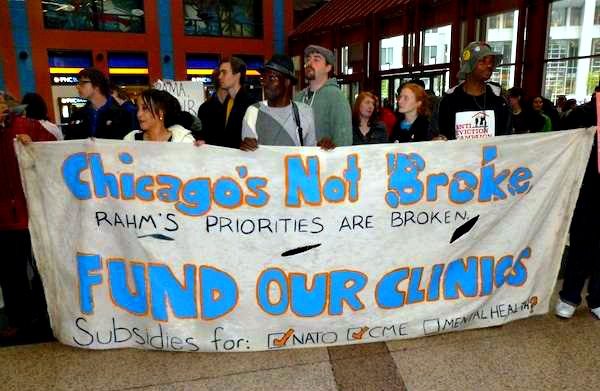
Political Contributor
CHICAGO - While six of the city's 12 mental health clinics have now been closed for nearly two months, Chicago's Mental Health Movement, a group of clients and advocates demanding the facilities regain city funding, is not letting them go quietly.
On Tuesday, protesters took over the Chicago Department of Public Health and refused to leave until they had a promise the six closed clinics would be reopened, and a letter of resignation from Health Commissioner Dr. Bechara Choucair, according to a release from the Movement.
Six protesters were arrested for trespassing Tuesday night, among at least 50 advocates who joined the demonstration..
Many of the activists involved in the public health department occupation came from the Woodlawn Clinic, where Mental Health Movement members have been camped out since it closed in early April. Another group of protesters have also set up a protest site outside the also-closed Logan Square Clinic since mid-May.
Tuesday's demonstrations marked the two-month anniversary of the clinic closures, which Mayor Rahm Emanuel approved, and also commemorated the death of patient leader, Helen Morley, one week earlier, according to a release from the Mental Health Movement. Morley, a member of the opposition, was quoted repeatedly in the press emphasizing her reliance on the Beverly-Morgan Park Mental Health Center saying "if you close my clinic, I will die." Some advocates say they believe the stress of the closures contributed to her death.
Throughout the months of protests, demonstrations and arrests, the city has stood by the decision to halve their mental health service providers, which Emanuel has said will save the cash-strapped city some $3 million.
Dr. Choucair, the subject of Tuesday's protest, has argued that all displaced patients will continue to have access to quality care. But the Mental Health Movement has consistently pushed back, saying the consolidations will prevent some people from seeing their doctors or getting their medications.
"Our neighbors, friends and family members are not receiving their services because the clinics are no longer in their communities. Where will these people go when the only available facilities are miles away? Out in the street?" mental health advocate Amy Saucedo told Le Prestige.
"Hospitals, like Cook County, are overcrowded," Saucedo elaborated. "We are pleading to the city to help its citizens. We pay taxes: it's the least they can do."

 RSS Feed
RSS Feed


